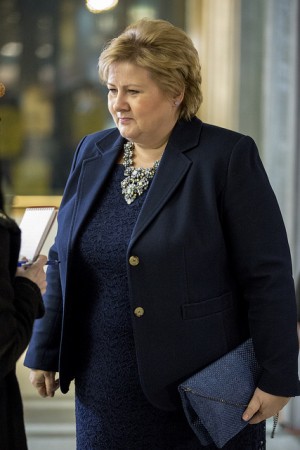In the latest sign of frosty relations between Norway and Russia, Prime Minister Erna Solberg won’t be taking part in ceremonies in Moscow marking the 70th anniversary of the end of World War II. It remained unclear whether anyone else will represent the Norwegian government at the ceremonies set for May 9.

Solberg wasn’t commenting directly on her pending absence. Rather, Norwegian Broadcasting (NRK) reported that her office chose to issue a statement late Wednesday mentioning that it was not possible for the prime minister to take part in what was described as “primarily a military arrangement,” because of the current “political situation.”
Solberg’s office said it was “unfortunate that the situation is such,” putting the responsibility directly on Russia because of its intervention in Ukraine: Russia’s alleged violations of the rule of law, according to the prime minister’s office, “have created a political situation in Europe that no one wants.”
Russia’s foreign minister, Sergej Lavrov, took part in ceremonies in Norway’s northern county of Finnmark last October, to mark the 70th anniversary of the liberation of the area from Nazi German occupation during the war. Solberg, King Harald and Norwegian Foreign Minister Børge Brende also took part, but now Solberg won’t travel to Russia in return.
Her office stated that it is “important to respect the contributions made during World War II.” The Norwegian government “therefore put great emphasis” on the Soviet Army’s “major contribution” to the liberation of Eastern Finnmark in October, taking part in memorials together with Lavrov.
Solberg’s decision to bow out of the event in Moscow follows similar decisions made by other western leaders, and signals “how serious the situation is,” said Julie Wilhelmsen, a researcher at the Norwegian foreign policy institute NUPI who specializes in Russian relations. Wilhelmsen said she wasn’t surprised Solberg had declined the Russians’ invitation.
“After the Ukraine crisis, relations between Russia and the West have been very bad,” Wilhelmsen told Norwegian Broadcasting (NRK). “One might think that it would be in Norway’s interests, and part of its history, to conduct a dual policy so that we could mark what we disagree with, but also cooperate in other areas, not least because Norway and Russia are neighbours and have had broad cooperation in the Far North.” Norway has been able to deal with Russia in a “pragmatic manner,” Wilhelmsen said, in such areas as fishing and on Svalbard, “but we see that doesn’t work any longer.”
Relations between Norway and Russia thus seem to have sunk to a new low, with Defense Minister Ine Eriksen Søreide repeating in Parliament on Wednesday that relations have changed dramatically. “Our relation to Russia has always been charactized by permanence and predictability,” Søreide said on the floor of Parliament. “But with the aggression we now see, it’s not probable that we in the short term can come back to the relation we had.”
British Prime Minister David Cameron and German Chancellor Angela Merkel have also opted to drop the Moscow ceremonies, as have the leaders of Poland and the Baltic countries. Heads of state who have accepted the Russian invitation include North Korean leader Kim Jung-un and Chinese leader Xi Jinping.
newsinenglish.no/Nina Berglund

